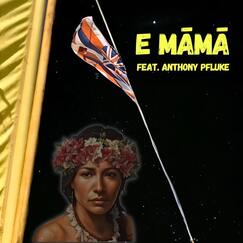
Honolulu, HI - Kīhei born Kamaka Camarillo has released a new single, E Māmā, about his personal journey to learn his mother tongue (ʻōlelo Hawaii) and Hawaiian culture. It draws its inspiration from the remarkable journey of his dear friend, Anthony Pfluke, and his quest to learn Hawaiian. Says Kamaka, "The Hawaiian language faced a dark period in its history when it was banned from spoken use in 1896. In "E Māmā," the lyrics are entirely in Hawaiian, and I adopt a perspective that invokes a call to my "parents." In this context, "māmā" symbolizes my mother tongue, and "papa" represents the culture. Because they both were "taken" from me, it is my inherent responsibility/kuleana, to embark on a daily journey of learning in hopes to reunite with them."
If the Camarillo name is familiar, it might be because his brother Kalaʻe has won multiple Nā Hōkū Hanohano Awards for his releases, and he comes from a long line of musicians and music educators, including but not limited to: his father Rama, a musician and also a music educator at Kamehameha Schools Maui; his great grandfather Joseph Nohea Kalima Sr., (who composed the classic traditional Hawaiian tune called “Hilo Hula"); his great uncle the late ʻukulele virtuoso Jesse Kalima; and his Aunty Lehua Kalima, a founding member of the multiple Nā Hōkū Award-winning group Nā Leo Pilimehana and a member of the group Kulāiwi. Camarillo himself is also a Nā Hōkū Hanohano Award winner and nominee.
Kamaka first picked up the ‘ukulele in the 4th grade during a summer ʻukulele program taught by his father. He also learned piano at a young age, but didn't begin singing until high school. He added guitar while pursuing his degree in music at UH Mānoa, studying classical guitar under Professor Peter Frary and Ian O’Sullivan. In addition to playing gigs at the Chart House and other venues, Kamaka is currently a music educator at Kaiser High School.
Composed by Kamaka, Nakana Wong, & Anthony Pfluke, E Māmā was produced and recorded by Imua Garza at Zeo Music. It features Camarillo, Pfluke, and Garza on vocals. Pfluke and Garza play ʻukulele, and Garza plays guitar, upright bass, keys, & percussion.
E Māmā is available on all digital platforms.

 RSS Feed
RSS Feed